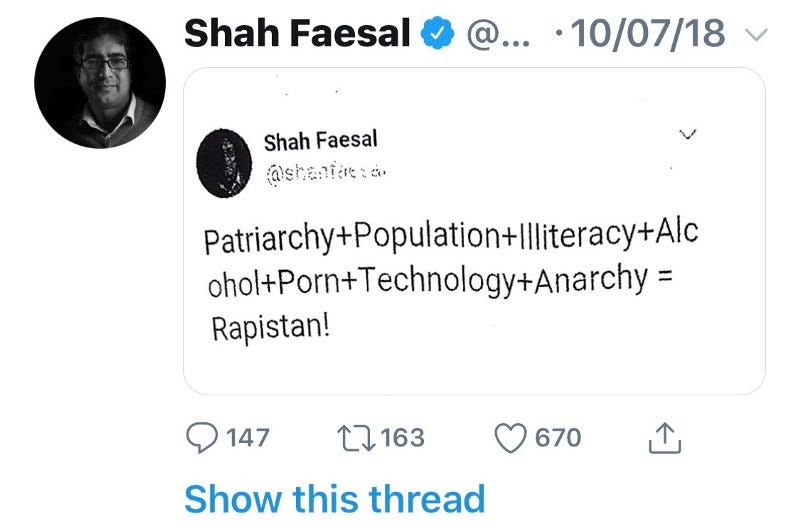Fundamental Rights versus Conduct Rules
Criticism of Government by IAS Officers. Should it be permitted?
Criticism of Government by IAS Officers. Should it be permitted?
Initiation of disciplinary proceedings against the 2010 batch J&K Cadre IAS Officer for his controversial tweet has triggered an animated debate whether the Fundamental Rights of a civil servant can be curbed, if so, to what extent, by virtue of the statutory “Conduct Rules” as applicable to Government employee. In this particular case, the Fundamental Rights in question are guaranteed to every citizen and include the all-important freedom of speech and expression (Article 19 (1)(a). It is important to note that the Constitution itself has provided, by virtue of Article 19(2), that reasonable restrictions can be placed by law in respect of the freedom of speech and expression in the interests of the sovereignty and integrity of India, the security of the State, friendly relations with foreign States, public order, decency or morality or in relation to contempt of court, defamation or incitement to an offence[1].
It has also been held by the Courts that not only should the aforesaid restriction be “reasonable”, it also should not to be arbitrary or excessive. Furthermore, there must a “direct or proximate nexus or a reasonable connection between the restrictions and the object sought to be achieved”. The restriction ought not to be wholly disproportionate to the evil sought to be remedied by the State. The All India Service Conduct Rules, 1968, applicable equally to the IAS, IPS and the IFoS, have been framed under the All India Services Act, 1951 and thus have the force of law. The two relevant statutory rules have been reproduced below for the facility of ready reference[2].
Conduct Rules Bar Government Criticism
Rule 6, on a plain reading, makes it amply clear that an officer does not require the previous sanction of the Government to publish any Social-Media Post, whether in bonafide discharge of his official duties, or otherwise (emphasis added). In other words, mere publication/ posting, even in his private capacity, does not per se require the previous sanction of the Government. The caveat, however, is that he ought to clearly state that the views expressed, are his own and not those of the Government (emphasis added). This quite understandable because when an officer, holding a high public position, publishes some views, the reader should not be mislead into believing that these are the official views of the Government. More importantly, Rule 6 does not obviate the need to observe or comply with the provision of other rules. In other words, Rule 6 does not grant an officer the liberty to flout the other rules pertaining to his act and conduct, in particular Rule 7, which pertains to the Criticism of Government.
Rule 7, read as a whole, makes interesting reading. Any statement of fact or opinion in the nature of criticism or any current or recent policy or action (emphasis added) of the Central/State Government is effectively prohibited. The Rule covers only “current or recent” policy/ action of the Government, leading us to interpret that it is only matters of topical interest that cannot be criticized. In other words, the officer is perhaps free to criticize the old and historical actions and policies of the Government. The matter would hinge upon the interpretation of the word “recent”, which is quite vague in itself.
Rule 7 out-of-sync with the RTI Act?
Interestingly, the very same Rule 7 permits an officer to make such criticism “in his official capacity and in the due performance of the duties assigned to him.” Thus, the Rule 7 permits an officer to record free and fair views on the official files and notings even if these amount to criticism of the Government, so long as the matter pertains to his official duties. In other words, in-house criticism is permitted, while the public criticism of the Government would amount to misconduct under the Conduct Rules. This, of course, raises an interesting scenario. Copies of most of such notings can be obtained by any private citizen under the provisions of the Right to Information Act, 2005 (RTI Act), who can then publish or otherwise disseminate the same without coming within the mischief of the Conduct Rules, which applies only to Government Officers. Clearly, Rule 9, which was framed and notified much before the day and age of the RTI Act is a little out of sync with the modern times, with emphasis on transparency and openness.
Conduct Rules vis-a-vis Fundamental Rights
Now, we come to the cardinal question whether prohibiting criticism of the Government is a reasonable restriction on the Freedom of Speech and Expression and whether it is permissible under the provisions of Article 19(2) reproduced below. A simple perusal of the same would lead to the ineluctable conclusion that criticism of the Government is not permitted if and only if it impinges upon “sovereignty and integrity of India, the security of the State, friendly relations with foreign States, public order, decency or morality or in relation to contempt of court, defamation or incitement to an offence.” This, however, has to be seen in the context of Article 33 of the Constitution[3], which permits the Central Government, by law, to restrict or abrogate the Fundamental Rights of the Members of Armed Forces, Para-military Forces and Intelligence Agencies etc. It is also amply clear that Article 33 contains no reference to “Civil Service” and thus an across-the-board curb on the Freedom of Speech and Expression, by prohibiting the criticism of Government actions/ policies, is perhaps not constitutionally permissible, unless it falls within the reasonable restrictions envisaged under Article 19(2). Thus, a harmonious interpretation of Rule 7 in the over-arching context of Article 19, read with Article 33, would be that an IAS officer is free to criticize the current as well as recent policies or actions of the Government, unless it impacts upon the “sovereignty and integrity of India, the security of the State, friendly relations with foreign States, public order, decency or morality or in relation to contempt of court, defamation or incitement to an offence.” This, of course, is not the extant official view and it is only a matter of time before this contentious issue is conclusively sorted out by the Apex Court.
Another argument arrayed by the proponents of gagging the voice of an AIS Officer is that once a person agrees to join an All-India Service, knowing full well the provisions of the governing statutory Conduct Rules, such officer cannot subsequently argue that the said rules do not apply to him. This is a very specious and fallacious argument. The Courts have in no uncertain terms held that a citizen does not alienate and cannot be compelled to waive, his Fundamental Rights upon taking public office[4]. In a word, Government servants are to be subjected to the same constitutional tests that apply to a private citizen, when determining whether his Fundamental Rights have been violated. Moreover, an AIS Officer is required to subscribe to an oath to uphold the Constitution of India and this can, by no stretch of imagination, be construed as just abiding by the Conduct Rules in a mechanical manner, while frittering away his valuable Fundamental Rights.
Harmonious Interpretation
It may be pertinent to mention here that even within the framework of the Contempt of Courts of Act, 1981, as per section 5[5], fair criticism of a judicial act does not amount to contempt. If our law can permit such criticism of even the Supreme Court of India, there is perhaps no reason why a healthy criticism of the Government’s actions and policies on part of AIS officers be regarded as misconduct. Thus, in a democratic polity that should encourage discussion and discourse, debate and dissent and in an era of the RTI Act, an omnibus and mechanical ban on the criticism of the recent policy and actions of the Government by AIS Officers, in their private capacity, may be a little incongruous with the times. However, the officers must carefully self-regulate themselves and make sure that in exercising their Fundamental Rights, criticizing the Government, should not transgress into the exceptions stipulated under Article 19(2) of the Constitution. Should be do so, they shall face the penal consequences of the Conduct Rules. However, we all await a suitable verdict of the Supreme Court so that this contentious issue is settled, once and for all.
[1] 19. Protection of certain rights regarding freedom of speech etc
(1) All citizens shall have the right
(a) to freedom of speech and expression;
(2) Nothing in sub clause (a) of clause (1) shall affect the operation of any existing law, or prevent the State from making any law, in so far as such law imposes reasonable restrictions on the exercise of the right conferred by the said sub clause in the interests of the sovereignty and integrity of India, the security of the State, friendly relations with foreign States, public order, decency or morality or in relation to contempt of court, defamation or incitement to an offence.
[2] 6. Connection with press or radio — Previous sanction of the Government shall not be required when the member of the service, in the bonafide discharge of his duties or otherwise, publishes a book or contributes to or participates in a public media. Provided that he shall observe the provisions of rules and at all times make it clear that the views expressed, are of his own and not those of the Government.
7. Criticism of Government. — No member of the Service shall, in any radio broadcast or communication over any public media or in any document published anonymously, pseudonymously or in his own name or in the name of any other person or in any communication to the press or in any public utterance, make any statement of fact or opinion, —
i. Which has the effect of an adverse criticism of any current or recent policy or action of the Central Government or a State Government; or
ii. which is capable of embarrassing the relations between the Central Government and any State Government; or
iii. which is capable of embarrassing the relations between the Central Government and the Government of any Foreign State:
Provided that nothing in this rule shall apply to any statement made or views expressed by a member of the Service in his official capacity and in the due performance of the duties assigned to him.
[3] 33. Power of Parliament to modify the rights conferred by this Part in their application to Forces, etc.
Power of Parliament to modify the rights conferred by this Part in their application etc Parliament may, by law, determine to what extent any of the rights conferred by this Part shall, in their application to,
(a) the members of the Armed Forces; or
(b) the members of the Forces charged with the maintenance of public order; or
(c ) persons employed in any bureau or other organisation established by the State for purposes of intelligence or counter intelligence; or
(d) persons employed in, or in connection with, the telecommunication systems set up for the purposes of any Force, bureau or organisation referred to in clauses (a) to ©, be restricted or abrogated so as to ensure the proper discharge of their duties and the maintenance of discipline among them.
[4] https://indiankanoon.org/doc/687159/ (1962 AIR 1166, 1962 SCR Supl. (3) 369)
[5] 5. Fair criticism of judicial act no contempt. A person shall not be guilty of contempt of court for publishing any fair comment on the merits of any case which has been heard and finally decided.
__________________________________________________________________
KBS Sidhu. The Author is an IAS officer of 1984 Batch of Punjab cadre. The views expressed are his own.
He can be reached on kbs.sidhu@gmail.com or @kbssidhu1961 orhttps://www.facebook.com/kbs.sidhu





